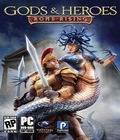Genre: MMORPG
Publisher: Sony Online
Developer: Perpetual
Release Date: June 1, 2007
One of the things that was impossible to ignore coming out of the GDC is that everyone and their mom is working on a massively-multiplayer online role-playing game, and that everyone and their mom is doing whatever they can to make their MMO different somehow. They're changing up the setting (Pirates of the Burning Sea, Tabula Rasa), using a license (Age of Conan, The Lord of the Rings Online, Pirates of the Caribbean Online), employing bizarre new payment schemes (most Korean MMOs, LotRO, PotCO, and whatever the hell it is that David Perry is working on), or adding elements of other genres (Hidden Earth).
(If MMOs follow the usual genre pattern, we'll see this go on for a few years before somebody decides to come out with a back-to-basics game, and that'll touch off a bizarre retro period where the games everyone is talking about are the ones that play like they're 10 years old.)
As such, Gods & Heroes: Rome Rising has an uphill battle ahead of it, and its developers know it. It has to overcome the traditional problems that come with having a brand-new IP from a relatively unknown developer, as well as the traditional problems you run into when you're more or less forced to innovate. For example, PVP won't be in the game until after launch, which is probably going to be a problem. (If my recent experience with MMOs is any indication, people are crazier for PVP than I would've imagined they'd be.)
Players in Gods & Heroes are the sons and daughters of the Greek gods, although they don't know it at first. You begin the game as a gladiatorial slave, and break out of captivity over the course of the tutorial. At this point, you get to pursue your true heroic destiny across the face of mythological Rome, complete with monsters, meddlesome gods, barbarians, and everyone dressing like "Clash of the Titans."
A beginning character in Gods & Heroes gets to adopt a patron god at the start of the game, choosing one of two available gods depending on his or her class. What god you choose will basically grant you access to a brand new, unique skill tree, access to which is determined by whether or not you've stayed in favor with your god.
The really interesting thing about the game, though, is that you can bring your own backup with you. You can begin recruiting minions very early on, and bring up to four of them along with you at any given time. Their abilities work to augment yours, and their areas of expertise are meant to help you compensate for your character's weak points.
A given minion's culture of origin will determine his or her resistances, look, and damage types, but all of them will generally fall into one of three classes: infantry, skirmisher, or spellcaster. If you're playing a squishy sort of spellcaster, you'll want to bring some infantry-based tanks along to intercept mobs for you, while sword-swinging tank players will want a healer or two and a couple of ranged skirmishers. Your minions will level up as you do, and you can issue direct commands to them in the field.
You recruit minions through finding their contracts, either in cities or through quests, and fulfilling the terms of their contracts, whether that means performing tasks or paying cash. You can also trade the contracts back and forth with other players.
There are a 132 minions in the game, 12 of which are monstrous mythological creatures that are affiliated with the 12 patron gods, such as cyclopses. You cannot recruit mythological minions that belong to a god other than your own, but the other 120 are fair game. Managing these minions is done by entering your camp, which works like a specialized, unique instance.
The general idea here is that you can customize and refine a squad for any given situation, and that every player will have a posse of minions with them, making every fight you get into look like a small-scale war, particularly if other players are with you. Perpetual has said that their inspirations for Gods & Heroes's combat were tournament fighters like Soul Calibur III, and they're hoping to lend the game's combat engine that kind of feeling of payoff.
(When I played the game, I didn't get the chance to play around with my minions very much. Before you get the minions, the game is a solid if not remarkable MMO, but the minions do change things up quite a bit. I can only imagine what it'll be like to have a full party of them.)
The current plan for Gods & Heroes is add PVP after it launches, with new content arriving via patch every two to four weeks. Expansions — knock on wood —will come out every year and will broaden the game world; the first expansion will add contested territory, allowing nations to battle each other for supremacy, and Perpetual is discussing the idea of adding brand-new nations, with new gods, monsters, and lands to explore. The Egyptians, Huns, and Chinese were among the cultures that were mentioned.
Gods & Heroes: Rome Rising has potential, but it's also got a lot of competition. This is an interesting time to be releasing an MMO, and it's anyone's guess whether this one will be able to stand far enough out from the crowd to succeed. We'll know by early June.
More articles about Gods and Heroes: Rome Rising













 Gods & Heroes is a massively multiplayer RPG of mythic adventure in the ancient world featuring epic God Powers, intense squad-based combat, and creatures drawn from the myths and legends of the ancient world.
Gods & Heroes is a massively multiplayer RPG of mythic adventure in the ancient world featuring epic God Powers, intense squad-based combat, and creatures drawn from the myths and legends of the ancient world.






















